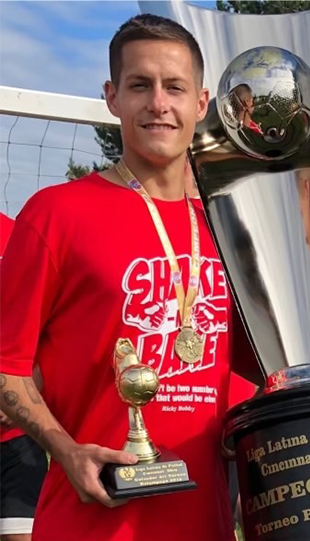Supported Ross Operation Shows Excellent Mid-term Results

Ryan Grothaus was diagnosed with aortic stenosis as a baby and had a balloon valvuloplasty. In his 20’s, his valve function worsened. As a result, his love of playing competitive soccer had to be put on hold.
Ryan spoke with adult congenital heart disease specialist Adam Lubert, MD, about his options. Together they decided that a supported Ross procedure to replace his aortic valve would be the best solution.
The supported Ross, a modification of the standard Ross, uses a sinus of Valsalva polyester tube graft to provide external support to the aortic root and reduce root dilatation.

The surgery team at Cincinnati Children’s Heart Institute performs on average 15-20 supported Ross procedures each year in patients ages 10 and up. Many of those patients are teens and young adults like Ryan. A paper recently published by Heart Institute members and others on the mid-term results of the supported Ross shows that the operation offers excellent support of the aortic root with minimal dilatation and regurgitation and no mortality.
Durability One of The Many Benefits
“In the right surgical hands, the supported Ross in my opinion is the aortic valve surgery of choice for young adults, because it provides them with excellent valve function, durability without the need for future surgery in most cases, and no need for anticoagulation,” says Lubert, a cardiologist with the Heart Institute’s Adult Congenital Heart Disease Program.
In addition to the benefits Lubert mentions, the supported Ross is also ideal for females wanting the possibility of pregnancy in their future. A mechanical valve is another option for these patients. However, mechanical valves require taking anticoagulants afterward, which can complicate pregnancy and put both mom and baby at risk.

A Full Return to Normal Activity
“The supported Ross provides the patient with what is essentially a normal aortic valve that will allow them to participate in almost any activity they’d like to take on,” explains James S. Tweddell, MD, executive co-director of the Heart Institute and the cardiothoracic surgeon who performed Ryan’s surgery.
For Ryan, his new valve has meant a full return to normal activity and he’s back to weight lifting and playing soccer. “I’m extremely pleased with my surgery. I feel better than before,” says Ryan, who had his operation in 2019 at age 28. “I didn’t realize what living with aortic stenosis felt like until I had a normal heart.”

